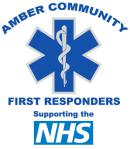What Do We Do?
Our Community First Responder (CFR) group consist of 25 dedicated volunteers from the local community. All our volunteers live and work in the local area, and operate on duty schedules according to availability and area of cover required. CFRs are trained to respond to emergency calls through the 999 call handling system in conjunction with the Ambulance Service. They provide immediate care to patients in their local areas where distance may delay the prompt arrival of an ambulance. Schemes like ours were originally created and responders trained to deliver Basic Life Support and defibrillation to patients in Cardiac Arrest. More recently, the training and capabilities of CFRs have been expanded so that we can attend a greater variety of calls and thereby help a larger number of patients.
We Make a
Difference
Even the best ambulance service in the world cannot get to every 999 call within the first few minutes. In fact the Ambulance service gets to most calls very quickly. But it may not be quickly enough - especially in countryside areas or large commercial complexes. There is a period of time between the 999 call being made and the ambulance arriving in which little or no emergency care takes place. This time period has been called the 'therapeutic vacuum'. We know that community based First Responders can fill this vacuum and provide essential simple treatment in those crucial first few minutes before the ambulance arrives.
Our CFR scheme was created in early 2015, with the initial group of 8 CFRs becoming operational in June of that year, with a supporting committee of 4. By the end of 2016 the number of responders had grown to 14, and between them they volunteered nearly 4000 hours and attended more than 1150 patients. In 2017, this has risen to more than 20 responders, 5000 hours and about 1500 jobs.
What Type Of Incidents Do We Attend?
Our CFRs are contacted by Ambulance control and asked to attend emergencies in their area. The types of emergencies typically include unconsciousness, chest pain, stroke, seizure, diabetic problems, falls, traumatic injuries and breathing difficulties and can be in the home, in the street or in the work-place.
An emergency ambulance is always dispatched to any
incident attended by a CFR. We are not expected to attend emergencies considered unsafe or situations
that are known to be violent.
Skills and equipment which our Community First Responders are qualified
in:-
- Use of Automated External Defibrillator (AED)
- Oxygen therapy
- Bag-Mask-Valve resuscitation and airway adjuncts
- CPR (Cardio-Pulmonary Resuscitation)
- First aid, patient care and assessment
- Recognition of cause and type of illness/injury
- Scene safety & incident management
- A number of our responders are now also qualified to attend trauma and paediatric calls and to take additional observations, such as temperature, blood pressure and blood sugar readings. They are known by the ambulance service as "Level 3" responders
- East Midlands Ambulance Service are in the process of introducing Level 4 responders, who will have further skills and carry an increased range of drugs and equipment
Types of medical emergencies which First Responders are trained for:-
- Category "1" calls - (serious, life threatening):-
- Cardiac arrest
- Unconscious and collapsed patients
- Chest pains (e.g. heart attacks and acute angina)
- Breathing difficulties (e.g. asthma, acute on-set bronchitis/emphysema)
- Diabetic emergencies (e.g. hypoglycaemia)
- Seizures or convulsions (e.g. epilepsy)
- Stroke (CVA)
- Anaphylaxis (allergic reaction)
- Choking patients
Here is a short video showing what CFRs do. (This is not our scheme in the video)




